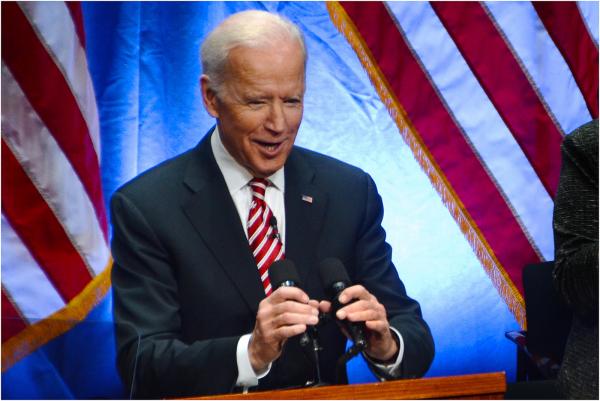March 4, 2020

Former Vice-President Joe Biden is shown at the second inauguration of Boston Mayor Martin Walsh in Jan. 2018. Chris Lovett photo
Former vice-president Joe Biden beat out Vermont Sen. Bernie Sanders by just 56 votes in the city of Boston, but won Massachusetts and eight other Super Tuesday states in a stunning reversal of presidential primary fortunes this week. The result was a devastating setback for the candidacy of Elizabeth Warren, the senior US Senator from Massachusetts, who finished third in the capital city and overall across the state.
Biden, whose campaign has surged since he won a landslide victory in the South Carolina primary on Feb. 29, carried the majority of precincts in Dorchester and Mattapan, according to a preliminary review of unofficial City of Boston Election Department results. Biden finished with 43,210 votes to Sanders’ 43,154— roughly 30 percent each. Warren finished the night in third position with 39,188 votes— or 27 percent. Former New York Mayor Michael Bloomberg finished a distant fourth with 11,878 or 8 percent.
According to preliminary numbers from the city’s Election Department, 144,200 ballots were cast in Boston on Tuesday, a turnout of roughly 34 percent citywide.
In Dorchester, Biden won 33 out of 60 precincts that comprise the neighborhood. He won the plurality of precincts in Wards 14, 16 and 17. He also won all but three of 23 precincts that cover Mattapan and Hyde Park and mounted bigger-than-average margins over his closest rivals in precincts where people of color are the dominant demographic. Biden also won the higher-numbered precincts in Ward 16, traditionally a base of white, more conservative voters in Neponset.
Sanders won the majority of precincts in Dorchester's Wards 13 and 15, including precincts clustered around Meetinghouse Hill, Fields Corner and the Polish Triangle.
Warren’s relatively weak performance in city neighborhoods stands in stark contrast to her past dominance in head-to-head elections against Republicans. In 2012, when she unseated incumbent Scott Brown in her electoral debut, Warren won 83 percent of the vote in Dorchester and 96 percent in Mattapan. In her 2018 re-election, Warren won the city of Boston with 80 percent of the vote over Trump loyalist Geoff Diehl.
But Tuesday’s contest— and Tuesday’s field of competition— was a different dynamic altogether. Sanders won 41 percent of the Boston vote in 2016 in a losing battle with Hillary Clinton. Last weekend, Sanders rallied on Boston Common with a raucous crowd of supporters that numbered close to 10,000 people by some estimates.
But, Joe Biden’s name has also been on Boston’s ballots before, alongside the most popular Democratic president of his generation, Barack H. Obama, whose electoral dominance in neighborhoods across the city remains a high water mark. A resurgent Biden campaign has seized upon his partnership with the former president on the campaign trail, labeling himself an “Obama-Biden” Democrat, a not-so-subtle jab at Sanders, who has only recently competed as a member of the party he hopes to lead.
On Tuesday, the Biden surge that was sparked in the Palmetto state could be seen in returns from places like Savin Hill’s Cristo Rey School, the bellwether 13-10 precinct. Sanders beat Clinton here in 2016, but in 2020 it was Biden who topped the ticket. The order of finish: Biden 243, Warren 239, Sanders 231, Bloomberg 46.
Sanders had better luck at the neighboring, lighter-voting precinct, Savin Hill Apartments in ward 15. There, the order of finish was Sanders 69, Warren 52, Biden 41. The Vermont Senator was also the ticket-topper at Fields Corner’s Viet-AID community center, where he won 96 votes to Warren’s 81 and Biden’ 59.
But, the former VP’s flex was felt in more pronounced fashion in Ward 16, a mix of Neponset, Clam Point, Ashmont and St. Mark’s precincts that can deliver mixed results, with the high numbered precincts typically leaning right (think Florian Hall’s 16-12, which sometimes shines Republican red on election days.)
On Neponset Avenue, Biden was the ticket-topper at the busy double-precinct polling station inside St. John Paul II Catholic Academy, a parochial school named for a Polish pope in what has long been an Irish-Catholic section of town. There, Biden was blessed with 340 votes to Sanders’ 235 and Warren’s 154.
Warren’s loss in Massachusetts is sure to amplify calls for Warren to exit the race, even as she and her campaign have talked about staying in “for the long haul” and have laid out a strategy reliant on there being no clear nominee heading into the July convention.
Warren voted in Cambridge on Tuesday morning before flying to Michigan, which votes next Tuesday, where she staged an evening rally in Detroit.
“Here’s my advice: cast a vote that will make you proud,” Warren said at the rally, urging voters in Michigan not to try to play the role of political pundit.
Asked whether she was concerned about the possibility of losing Massachusetts to Sanders, Warren said, “I’m not worried. I’m happy to be a part of this democratic process.”
But Warren didn’t just lose to Sanders. She also lost to Biden, whose resurgent campaign had been polling a distant fifth in the last Boston Globe/Suffolk University poll over the weekend that had him behind even Bloomberg and Pete Buttigieg, who wound up dropping out and endorsing Biden.
Warren’s failure to win at home makes her an anomaly in the long and storied history of presidential politics in Massachusetts, where virtually every home-state candidate since at least John F. Kennedy in 1960 has been able to carry Massachusetts.
The other exception to the rule was also on the ballot Tuesday night, though former Gov. William Weld was never really considered a viable challenger to President Donald Trump in the GOP primary. With more than half of all precincts reporting, Weld had about 9 percent of the Republican primary vote.
State House News Service reporting contributed to this article.
Topics:


